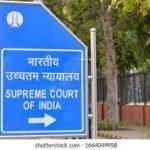In June 2009, an FIR was registered against the appellant’s husband for illegally demanding and receiving money. Subsequent raids uncovered disproportionate movable and immovable properties acquired by the husband, with some assets held in the appellant’s name. The total alleged disproportionate assets amounted to Rs. 60,99,2163.
Charges: The appellant’s husband was charged under Section 13(2) read with Section 13(1)(e) of the Prevention of Corruption Act, 1988 (hereinafter ‘1988 Act’)3. The appellant was charged with abetment under Section 109 of the Indian Penal Code (IPC) read with Section 13(2) and 13(1)(e) of the 1988 Act.
Lower Court Decisions:
The Trial Court found both the appellant and her husband guilty, noting disproportionate assets of Rs. 37,98,752 beyond known income sources. The husband was sentenced to 2 years rigorous imprisonment (R.I.), and the appellant, for abetting, was sentenced to 1 year R.I..
The High Court dismissed their appeal, sustaining the conviction and sentence, observing that the disproportionate assets were “hugely excessive” and not from known sources.
Law Involved
The judgment hinged on the interpretation and application of:
Section 109 of the Indian Penal Code (IPC): This section deals with the punishment for abetment.
Section 107 of the IPC: Defines “abetment of a thing,” which includes instigating a person to do a thing, engaging in a conspiracy for doing a thing, or intentionally aiding the doing of a thing. Explanation 1 clarifies that wilful misrepresentation or concealment of a material fact, by which a person causes or procures a thing to be done, constitutes instigation.
Section 13(1)(e) of the Prevention of Corruption Act, 1988: Defines the offence of a public servant obtaining pecuniary resources or property disproportionate to their known sources of income. (Note: This provision was later substituted by Section 12 of the 1988 Act via a 2018 Amendment, which specifically addresses punishment for abetment of offences under the Act).
Precedent: The Court referred to P. Nallammal & Anr. v. State, represented by Inspector of Police (1999) 6 SCC 559, which held that non-public servants could be convicted for abetting a public servant under Section 13(1)(e) of the 1988 Act.
Reasoning
The Supreme Court affirmed the lower courts’ decisions based on the following reasoning:
Definition of Abetment: The Court meticulously reviewed Section 107 IPC, emphasising that abetment includes intentionally aiding the commission of an offence. It noted that wilful concealment of material facts (as per Explanation 1 of Section 107 IPC) can constitute instigation.
Applicability to Disproportionate Assets: The Court explained, using illustrations, how the offence under Section 13(1)(e) of the 1988 Act can be abetted by non-public servants6. For example, if a public servant’s relative persuades them to conceal wealth obtained through bribery, or if a friend allows assets acquired through bribery to be held in their name, it amounts to abetment.
Appellant’s Role: The Court found that the appellant was undoubtedly guilty of abetment by “concealing such wealth by keeping assets in her name”. This action directly aided her husband in acquiring disproportionate assets.
Irrelevance of Marital Status Change: The appellant’s argument that her relationship with her husband had changed and he had re-married was deemed immaterial, as the offence was committed at the time of the commission of the crime. The core legal principle remains that a non-public servant can be convicted for abetting the accumulation of disproportionate assets.
No Interference with Findings: The Court concluded that there was no reason to interfere with the concurrent findings of the Trial Court and High Court, as the evidence supported the charge of abetment.
Holding
The Supreme Court dismissed the appeal, thereby sustaining the appellant’s conviction and sentence for abetment under Section 109 IPC read with Section 13(2) and 13(1)(e) of the 1988 Act. The appellant, being on bail, was directed to surrender within four weeks .
P. Shanthi Pugazhenthi V. State Represented By The Inspector Of Police Spe/Cbi/Acb/ Chennai
Supreme Court: 2025 INSC 674: (DoJ 13-05-2025)






